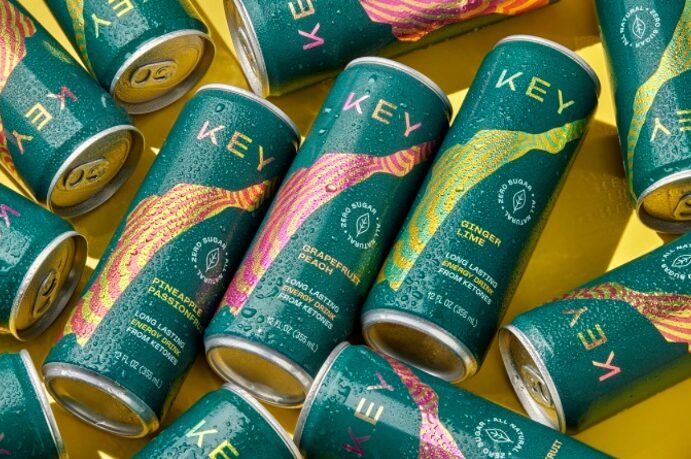Could a zero-sugar energy drink be the future of the heavily saturated beverage market? Possibly.
KEY, an energy drink start-up, recently emerged with $4 million in funding, according to an article by AFN. The start-up, which is led by former PepsiCo and Coca-Cola executives, uses ketones instead of sugar to give a boost of energy to its consumers. Ketones are energy molecules that are created when stored body fat breaks down and the body doesn’t have access to carbs or glycogen.
KEY features 80mg caffeine, is sweetened with stevia, and notably uses Avela, which is one of three ketones that provide energy when the body is fasting or in ketosis, according to AFN. According to Dr. Tekla Back, co-developer of KEY, Avela is a game-changer ketone because it’s efficient, tastes good and is affordable.
“We’re unlocking an alternative source of energy from ketones instead of a spike followed by a crash, which is what you get with a lot of energy drinks now, which are cutting the sugar but adding huge amounts of caffeine,” Dr. Tekla Back said in the AFN article.
Manuel Gonzalez, partner at AgFunder, says that KEY answers consumers’ desires for natural and sustained energy without sugar and that its short, clean-label ingredient list makes it an appealing option, according to AFN.
Will Energy Drinks with Ketones Ignite the Market?
The Food Institute was curious whether or not this trend was worth watching, so it reached out to Lenny Lee, a Keto food entrepreneur at Rave Superfoods. He shared his insights on the positives and the negatives of energy drinks with ketones.
Postives
Lee says that many consumers are wary about reports of possible health concerns such as heart issues or energy “crashes” for people consuming energy drinks based on stimulants such as caffeine or guarana, which makes an alternative ingredient appealing. He believes that KEY’s main appeal, however, could be zero sugar rather than the fact that it’s ketone-based.
“The International Food Information Council’s 2022 Food and Health Survey found that only 7% of consumers are on a Keto diet. However, a whopping 73% are trying to limit or avoid sugar,” Lee shared with The Food Institute.
KEY’s clean ingredients are extremely appealing as more people are becoming health-conscious in their food choices.
Negatives
The lack of familiarity with ketones could hurt KEY, Lee says.
“Ketones are unfamiliar to most consumers. Even though KEY bills ketones as a natural ingredient, consumers may be reluctant to consume an ingredient they’re unfamiliar with,” Lee told The Food Institute.
And for those familiar with the term “keto” or “Keto Diet,” it may actually be a turn-off as some associate keto with a “fad diet;” searches for “Keto Diet” have fallen by 80% since 2019.
The Future of KEY is unclear, but its strong funding and focused marketing will make it an exciting company to watch.
The Food Institute Podcast
Corn stocks, poultry flocks, and highly-pathogenic avian influenza – what does the U.S. agricultural system look like amid inflation and other headwinds? Wells Fargo Chief Agricultural Economist Dr. Michael Swanson discussed specialty crops, grain plantings, and what to expect in the growing year to come.










